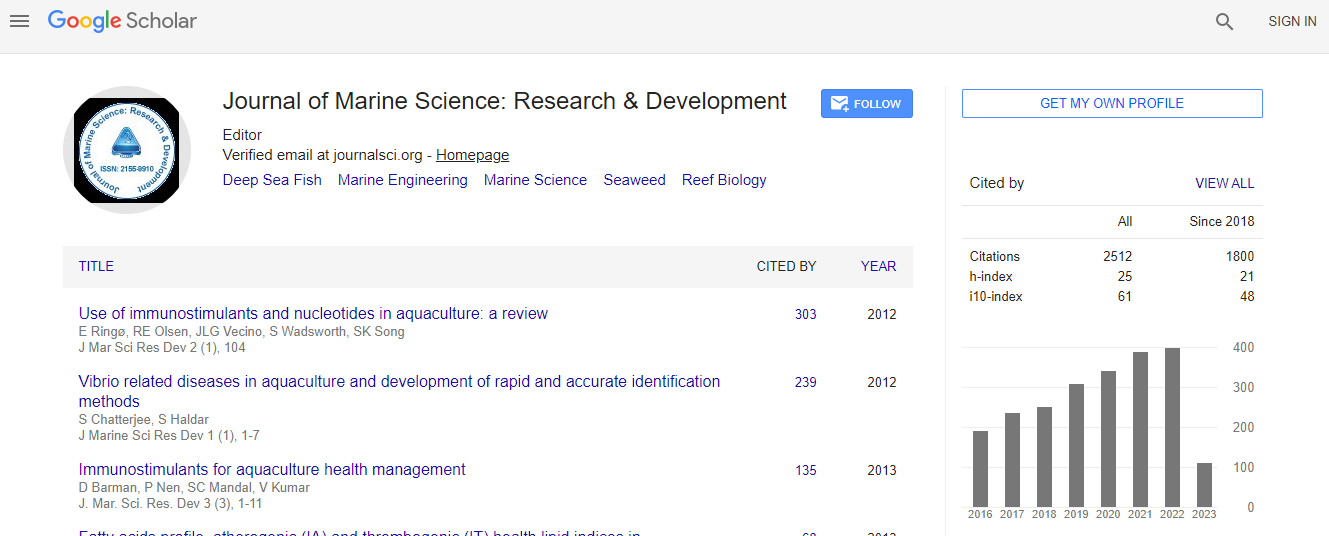Research Article
Effects of Harvest and Post-Harvest Processing Methods on Quality of Beche-de-mer in Fiji Islands
Ravinesh Ram1*, Roveena Vandana Chand2 and Paul C. Southgate1
1Centre for Sustainable Tropical Fisheries and Aquaculture, College of Marine & Environmental Sciences, James Cook University, Townsville, Queensland 4811, Australia
2School of Biological and Chemical Sciences, Faculty of Science Technology and Environment, University of the South Pacific, Suva, Fiji Islands
- *Corresponding Author:
- Ravinesh Ram
Centre for Sustainable Tropical Fisheries and Aquaculture
College of Marine & Environmental Sciences
James Cook University, Townsville
Queensland 4811, Australia
Tel: +6799362543
E-mail: ravinesh.ram@my.jcu.edu.au, ravineshram@gmail.com
Received date: September 10, 2014; Accepted date: October 27, 2014; Published date: October 29, 2014
Citation: Ram R, Chand RV, Southgate PC (2014) Effect of Harvest and Post-Harvest Processing Methods on Quality of Bêche-De-Mer in Fiji Islands. J Marine Sci Res Dev 4:153. doi:10.4172/2155-9910.1000153
Copyright: © 2014 Ram R, et al. This is an open-access article distributed under the terms of the Creative Commons Attribution License, which permits unrestricted use, distribution, and reproduction in any medium, provided the original author and source are credited.
Abstract
The sea cucumber fishery and processing of sea cucumbers into bêche-de-mer (BDM) supports livelihoods and generates significant export income in Fiji. Harvesting and processing of sea cucumbers has been done in Fiji for over two centuries and the processing technique has changed little over this time. Processing of sea cucumbers involves a number of steps: first boiling, slitting and gutting, smoke drying and sun drying. This study investigated the effects of harvesting and post-harvest handling techniques on the quality of BDM produced in Fiji and documented difficulties faced by the BDM processors in producing a good quality product. Our results show that to generate income as soon as possible, sea cucumber fishers in Fiji hastened BDM processing by eradicating or shortening necessary processing steps. This resulted in production of lower quality product with lower value and reduced acceptance. The first boiling and smoking steps of processing were particularly problematic for fishers. A well processed BDM product has good odour, appearance, shape, color and size and has moisture content appropriate for storage without spoilage. Processed BDM sold by fishers to the main exporters in Fiji were generally of low quality because of a number of consistent characteristics that greatly impacted on quality and product value. Common problems with product quality included improper cleaning, contamination with sand, peeling skin resulting from over-boiling and burning resulting from an inappropriate smoking technique. The results of our study have prompted immediate awareness and education activities for sea cucumber fishers and processors in Fiji supporting improvements in product quality and improved income from this important coastal livelihood.

 Spanish
Spanish  Chinese
Chinese  Russian
Russian  German
German  French
French  Japanese
Japanese  Portuguese
Portuguese  Hindi
Hindi 